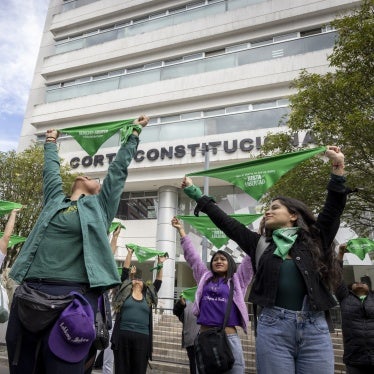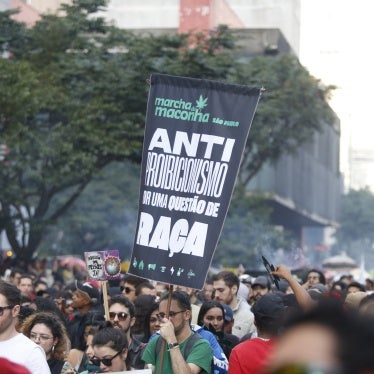Instead of attacking the news media for reporting allegations of criminal activity in a Colombian intelligence agency, President Álvaro Uribe should ensure a full investigation of the charges, Human Rights Watch said today.
Over the last two weeks, major news media have extensively reported on allegations of paramilitary infiltration of the Colombian executive branch's intelligence agency (Departamento Administrativo de Seguridad, or DAS), targeted killings of labor union leaders and academics, and electoral fraud in the 2002 presidential elections. President Uribe has reacted by charging the news media with being dishonest and malicious, and with harming Colombian democratic institutions.
"Journalists are obliged to cover these alarming allegations of corruption and human rights abuses by the presidency's intelligence service," said José Miguel Vivanco, Americas director at Human Rights Watch. "President Uribe's aggressive response raises suspicion about whether he actually wants the truth known, and has a chilling effect on the exercise of freedom of expression."
Uribe singled out individual commentators and journalists, including Alejandro Santos, who directs the prestigious newsmagazine Semana, and Ramiro Bejarano, a distinguished attorney appointed to a high-level commission established last year to investigate corruption in the DAS.
The allegations were made by a former senior official at the DAS, Rafael García, who is currently under investigation for allegedly laundering money and erasing the records of several people from the DAS database.
According to García's statements to prosecutors and journalists, for approximately three years the DAS worked in extremely close contact with several paramilitary groups, particularly the "Northern Block" led by paramilitary commander "Jorge 40." He claims that these links were established by Jorge Noguera, then director of the DAS and currently the Colombian Consul in Milan. Among García's many detailed allegations, which have received extensive coverage in Colombia, are:
- Extrajudicial executions of labor union leaders: García states that during this period the DAS provided the paramilitaries with lists of labor union leaders and academics, many of whom were subsequently threatened or killed.
- Electoral fraud: According to García, Noguera collaborated with the paramilitaries to carry out massive electoral fraud when he was Uribe's campaign director in Magdalena state during the 2002 presidential elections. García alleges that the fraud resulted in 300,000 additional votes for Uribe. A similar plan, he claims, had also been implemented in congressional elections in several northern states. If proven, his allegations would confirm recent studies attributing highly unusual voting patterns in the 2002 congressional elections to electoral fraud.
- Political assassination in Venezuela: García recently said in an interview that the DAS collaborated with paramilitaries in a plot to assassinate several Venezuelan leaders, including President Hugo Chavez and a prosecutor, Danilo Anderson. More than 100 alleged paramilitaries were arrested near the Venezuelan capital of Caracas, and a few months later, Anderson was killed. Based on testimony by one of those arrested, Venezuelan authorities have charged former DAS director Noguera with knowledge of the alleged plot.
Noguera has denied all García's allegations. Yet, earlier this month, he admitted to having met with paramilitary commander Jorge 40 "for institutional reasons."
In response to this admission, Bejarano published a newspaper column in which he asked why the government would have authorized Noguera to meet with a paramilitary commander, and, if the meetings were unauthorized, whether the government had ordered an investigation.
In a subsequent interview Uribe surprisingly admitted that he had twice personally met paramilitary commander Salvatore Mancuso, who has been convicted of human rights abuses and is wanted for extradition to the United States for drug-trafficking. The president said that Bejarano "better not come out saying" that Mancuso is Uribe's friend, as that would distort his statement.
"Instead of complaining about columnists asking legitimate questions, Uribe should explain his own meetings with Mancuso," said Vivanco.
In the last few days, the Office of the Attorney General of Colombia announced the establishment of a special team of investigators to verify García's charges. It also announced that the Attorney General, Mario Iguarán, would directly oversee the cases related to the DAS. Human Rights Watch emphasized the importance of a thorough, efficient, and independent investigation by the attorney general's office.
"This case affects powerful interests, which will probable exert pressure to make sure that the truth does not come out," said Vivanco. "For that reason, its handling of this case will be the first real test of the independence of the attorney general's office under Mario Iguarán."
Noguera resigned as director of the DAS in October, after a series of earlier scandals involving allegations that the agency was involved in sales of information to paramilitaries. The Uribe administration then appointed Noguera as consul in Milan.
After Noguera's resignation, the government announced a plan to restructure the DAS. A high-level commission named to investigate the allegations of corruption in the DAS concluded that it had become "vulnerable to the penetration of external agents," and called for a criminal investigation and radical reform of the institution.
The DAS operates directly under the authority of the president of Colombia. In addition to its intelligence functions, it is charged with providing security to government officials and persons at risk, such as labor leaders, journalists, and human rights defenders.
"These allegations, and particularly the claims that the DAS may have been sharing information about people at risk, who it had the obligation to protect, are extremely serious," said Vivanco. "The government should adopt the high-level commission's recommendations and thoroughly reform the agency."








